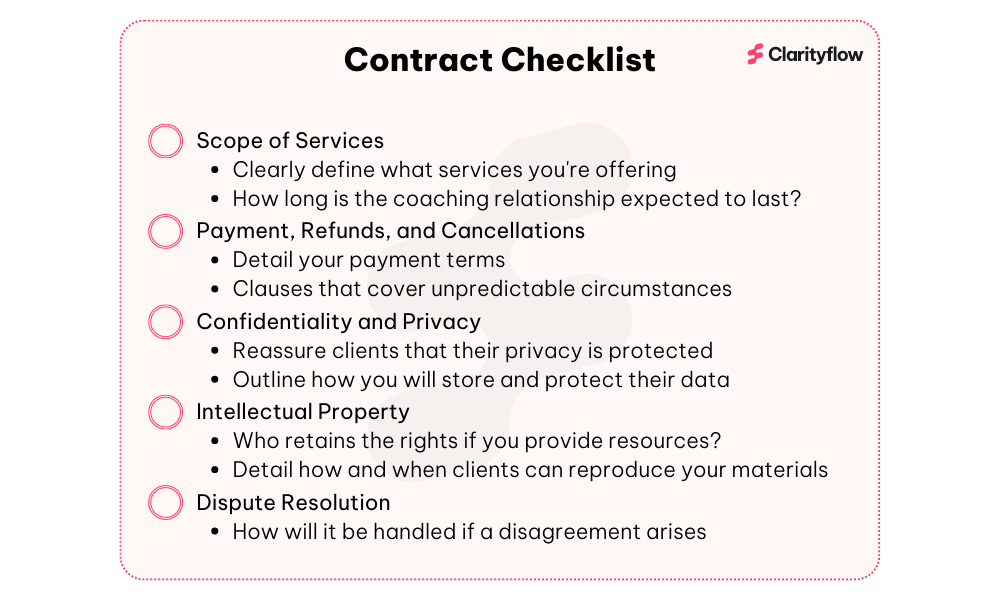Coaching Contract Essentials: A Simple Guide to Success

Imagine stepping onto a dance floor without knowing the steps, the rhythm, or even the type of dance. Feeling lost? That's what diving into the coaching realm without a solid coaching contract can feel like.
But here's the good news: you don't need to twirl in confusion or misstep into pitfalls. The right contract is like a choreographed dance routine - clear, structured, and leading to a harmonious outcome.
In this guide, we will break down the steps of a successful coaching contract, bust those myths that might throw you offbeat, and even hand you some sample templates for a graceful start.
So, lace up those dancing shoes, and let's waltz through the world of coaching contracts with confidence!
Here’s what we’ll cover in this guide:
Why Do You Need a Coaching Contract?
Dive into the core reasons why a contract isn't just paperwork—it's the bedrock of a successful coaching relationship.What Should Your Coaching Contract Include?
The meat and potatoes! Let's uncover the essential elements that make a coaching contract both protective and clear.How Do You Use Your Coaching Contract?
It's not just about having a contract, but about using it right! Here's your guide to adapting and explaining it to your clients.Common Misconceptions About Coaching Contracts
Busting myths and setting the record straight. Get ready to debunk those common misconceptions that could be muddying the waters.How Do You Enforce Your Coaching Contract?
Things not going as planned? Let's chat about making sure your contract stands firm and is honored by all parties.What About All Those Other Legal Considerations?
Beyond the basics, we'll explore the broader legal landscape ensuring you're not just covered, but cruising confidently.
Why Do You Need a Coaching Contract?
So, you've probably heard whispers around the water cooler or seen those ominous Facebook posts cautioning against the so-called "dangers" of coaching contracts. Maybe someone mentioned they're too restrictive or, on the flip side, that they're just empty words on paper.
Let's explore some of the unmatched pros for creating a coaching contract:
Professionalism and Setting Expectations:
First things first, let's chat about professionalism. Having a coaching contract isn't just about looking good on paper; it's about ensuring everyone's on the same page. Think of it as your coaching relationship's blueprint.
By outlining roles, responsibilities, and what each party can expect from the other, there's clarity. No more guessing games or blurred lines—everything's laid out, crystal clear. It's like going into a fancy restaurant and knowing exactly what's on the menu; no surprises, just a delightful experience.
Like a blueprint: Maps out roles, responsibilities, and outcomes.
Clarity central: No more ambiguities. It's like knowing what's cooking in the kitchen before you even order.
Legal Protection for Both Parties:
Alright, it's not the most thrilling topic, but it's a crucial one. Your coaching contract isn't just a handshake; it's a legally binding agreement. If things go sideways (not that we wish it, but life happens), you and your client have a safety net.
More than a handshake: A solid, legally binding safety net.
The seatbelt of your coaching journey: Security for those unexpected bumps.
Trust-building with Clients:
Trust is the golden ticket in the coaching world. It's what turns a first-time client into a loyal advocate for your services. But how do you foster it? A coaching contract is a massive step in the right direction.
By putting commitments, boundaries, and expectations on paper, you show clients you take the relationship seriously. When clients see you're dedicated to ensuring a mutually beneficial relationship, that trust foundation grows stronger.
Trust builder: It turns one-time clients into loyal advocates.
Sends a loud message: "I'm all in for this partnership, and I value our relationship!"
Wrap it all together, and it's clear: the coaching contract isn't some optional accessory for selling your coaching services—it's an essential tool in your coaching toolkit. So, if you've been on the fence about drafting one, consider this your gentle nudge (or enthusiastic shove) in the right direction.
What Should Your Coaching Contract Include?
Now that we've chatted about the why behind coaching contracts, let's dive into the nitty-gritty: the what. Crafting that stellar contract isn't just about picking the right font (though a nice Arial or Times New Roman never hurt anyone!). It's about the substance—the real meat and potatoes.
Essential Elements Every Coaching Contract Should Have

Scope of Services:
What’s on the Plate? Clearly define what services you're offering. Is it one-on-one coaching? Group sessions? Online modules? Spell it out.
Duration & Frequency: How long is the coaching relationship expected to last? Weekly sessions? Monthly check-ins? The clearer, the better.
Payment, Refunds, and Cancellations:
Show Me the Money: Detail your payment terms. Is it an upfront fee? Installments? And when is payment due?
Oopsie-Daisy Clauses: Life's unpredictable. What if a client needs to cancel? Or if they're unsatisfied and request a refund? Your terms here keep things black and white.
Confidentiality and Privacy:
Secrets are Safe: Reassure clients that whatever they share stays between the two of you. This isn't just about trust; it's a legal commitment.
Data Handling: You'll likely have records or note in today's digital ages. How do you store and protect that data? Clients will want to know.
Intellectual Property:
Who Owns What? Who retains the rights if you provide resources, worksheets, or digital content? Can clients reuse or redistribute?
Stay Original: Ensure clients understand they can't reproduce your materials without permission. It protects your hard work and brand.
Dispute Resolution:
Peaceful Pathways: How will it be handled if a disagreement arises (fingers crossed it doesn't)? Mediation? Arbitration? It's vital to lay out the game plan.
Sample Contracts and Templates:
So, feeling a bit overwhelmed with all the details? Fret not! Sometimes, the best way to understand is by seeing. Here are a few sample contracts to guide you along. Think of them as the training wheels for your coaching contract journey:
ICF Sample Coaching Agreement (sample contract for 1-on-1 coaching)
ICF Sample Multi-party Coaching Agreement (sample contract for group coaching)
If these don't quite hit the mark, check out these platforms for a broader selection of samples:
Rocket Lawyer – A platform known for its wide range of legal documents, including coaching contracts.
LegalTemplates – Offers various templates tailored for different industries, including coaching.
PandaDoc – A platform that allows users to create, send, eSign, and track documents online.
JotForm – While primarily known as a form builder, JotForm also has a library of contract templates.
Clarityflow offers a seamless connection with JotForm and PandaDoc (as well as thousands of other tools) via its Zapier integration!
By now, you should have a pretty solid blueprint in mind. Remember, while these elements are essential, it's equally important to adapt and mold your contract to fit the unique nuances of your coaching style and clientele.
And hey, if ever in doubt, there's no harm in consulting a legal expert. After all, it's all about dancing with confidence, right?
How Do You Use Your Coaching Contract?
Ah, you've got your coaching contract in hand. It's polished, professionally drafted, and you're proud of it. But what next? Having a masterpiece of a contract is one thing, but effectively wielding it in the practical arena is where its true value shines.
Let's chat about how to put that document into action.
1. Customizing for Different Clients:
Every coaching relationship is as unique as a fingerprint. While the foundation of your contract might remain consistent, it's essential to tweak certain elements to suit individual clients. Whether it's adjusting payment plans, modifying session durations, or even changing communication methods, each client may have specific needs.
Your contract should be flexible enough to cater to these while maintaining your professional boundaries.
2. Explaining Terms to Clients:
Let's face it. Not every client will be well-versed in legalese. That's where your role as a coach extends beyond just coaching. Before both parties sign on the dotted line, take a moment to walk your client through the contract.
Ensure they understand each clause and be open to answering questions. A well-informed client is more likely to be a satisfied one. This step helps foster trust and ensures that both parties are on the same page—literally.
3. Revision and Ongoing Updates:
The coaching landscape isn't static. Your contract might need a spruce-up as you evolve in your practice, learn from experiences, or even as laws and industry standards change. Periodically reviewing and updating your agreement ensures it remains relevant and effective.
Maybe you've incorporated new coaching tools, or expanded your services—your contract should reflect these evolutions.
But remember, any time you make significant changes, it's not just about adjusting the document; it's about re-establishing clarity with your clients. Discuss any amendments with them, ensuring they're in the loop and comfortable with the updated terms.
To summarize, your coaching contract isn't a "set-it-and-forget-it" document. Use it to strengthen your client relationships, ensuring transparency and mutual understanding at every turn. After all, it's not just about having a contract; it's about maximizing its potential in every coaching engagement.
Common Misconceptions About Coaching Contracts
In the bustling world of coaching, whispers of misconceptions often travel from one corner to another, especially regarding the topic of coaching contracts. You've probably heard a few of them, haven't you? Let's dive into these myths, tackle them head-on, and unveil the truth.
1. "Contracts Are Just a Formality, Nothing More."
Debunking: Here's the thing: contracts are way more than just a piece of paper. They're a testament to the professional relationship you're building with your client. It's not about formality, but clarity, commitment, and mutual respect.
2. "I've Got Trust; I Don’t Need a Contract."
Debunking: Trust is a beautiful thing! And guess what bolsters that trust even more? A contract. It is a clear roadmap for your coaching relationship, ensuring both parties understand and agree on the path forward.
3. "All Contracts are Basically the Same; Any Template Will Do."
Debunking: Imagine using the same recipe for every dish you cook. Sounds bland, right? While templates offer a solid foundation, every coaching relationship has its unique flavor. Personalizing your contract ensures it reflects the nuances of each engagement.
4. "Contracts Limit My Flexibility with Clients."
Debunking: Flexibility is crucial in coaching, but so is setting boundaries. A contract isn't there to shackle you but to define the playing field. It ensures everyone knows the rules, making any game-time changes smoother and more amicable.
Let's be clear: coaching contracts are more than mere formalities. They're the backbone of a transparent, trusting, and thriving coaching relationship. So, the next time you hear a myth floating around, you'll be well-armed with facts and ready to set the record straight.
How Do You Enforce Your Coaching Contract?
So, you've crafted that stellar coaching contract, tailored it to individual clients, and have been proactive in its application. But now, the rubber meets the road: what happens when something goes awry? Enforcing your contract is just as crucial as its creation.
Here's the lowdown:
Legal Enforceability
Foundation: Understand that your coaching contract is legally binding. This means that, provided your contract has been drafted correctly and both parties have willingly agreed to its terms, it holds weight in a court of law.
Importance of Expert Review: Ensure your contract's terms are legally sound. Having a lawyer review your contract can give you peace of mind that it'll stand up in court if need be.
Handling Breaches or Disputes
Open Communication First: Encountered an issue? Start with a candid chat. Many misunderstandings or minor breaches can be ironed out through simple dialogue.
Lean on Your Contract: If the issue persists, refer to your contract. It serves as a predefined guide for handling these situations.
Dispute Resolution Clause: Can't find common ground? Your contract should outline steps for resolution, whether it's mediation, arbitration, or other agreed-upon methods. Use this as your roadmap before jumping to legal proceedings.
In essence, enforcing your coaching contract boils down to recognizing its legal authority and leveraging it as a foundation for resolving disagreements.
While no one likes to think about potential disputes, having a robust contract by your side ensures you're prepared to navigate those challenges gracefully and professionally.
What About All Those Other Legal Considerations?
While coaching contracts are at the heart of a secured coaching relationship, it's crucial not to lose sight of the broader legal landscape. From jurisdictional concerns to ethics, let's unravel some of the other key legal considerations every coach should be mindful of:
Jurisdiction and Applicable Laws:
Think Global, Act Local: If you're coaching clients internationally, it's essential to determine which laws will govern your contract. Where will disputes be settled, and under which country's laws?
Stay Updated: Laws evolve. Whether related to data protection, business practices, or confidentiality, ensure you're updated about changes, especially if they impact your coaching practice.
Ethical Considerations:
Beyond the Legal: Not everything is black and white in the legal world. As a coach, you have an ethical responsibility to ensure the well-being and confidentiality of your clients. While some of these aspects will be covered in your contract, always lead with integrity and empathy.
Professional Standards: Are you part of a coaching association or body? Often, these entities have ethical guidelines for members. Familiarize yourself with them and ensure your practices align.
When to Seek Professional Legal Advice:
Starting Out: Getting professional legal input is wise if you're just setting up your coaching business or drafting your first contract. This helps lay a solid foundation.
Red Flags: If a client disputes a contract clause or you're unsure about certain terms, don't hesitate to consult a lawyer.
Regular Reviews: Make it a practice to periodically review your contract and practices with a legal lens. This proactive approach can save you from potential pitfalls down the road.
Navigating the labyrinth of legalities can seem daunting, but remember, it's all about safeguarding your coaching practice and clients. By staying informed, leaning into ethical practices, and knowing when to bring in the experts, you'll foster trust and ensure your coaching business remains on firm legal ground.
Wrapping Up: The Art of Crafting a Comprehensive Coaching Contract
Coaching, in its essence, is a journey—one that can be incredibly fulfilling and transformative for both coaches and clients alike. However, like any journey, it requires a roadmap to navigate potential pitfalls, and your coaching contract is that indispensable guide.
Approaching the world of coaching contracts might feel like delving into an intricate puzzle, but it becomes a manageable task with care, attention, and professional guidance. Taking the time to craft a robust contract safeguards your professional interests and lays the foundation for a successful and harmonious coaching relationship.
As you embark on this journey, remember that tools and platforms can significantly streamline the process. Why not make your coaching journey even smoother? Choose Clarityflow as your coaching platform, giving you the edge to focus on what you do best—coaching and making a difference.


